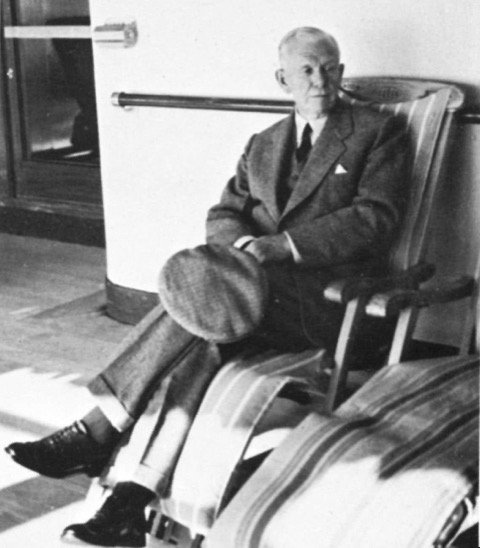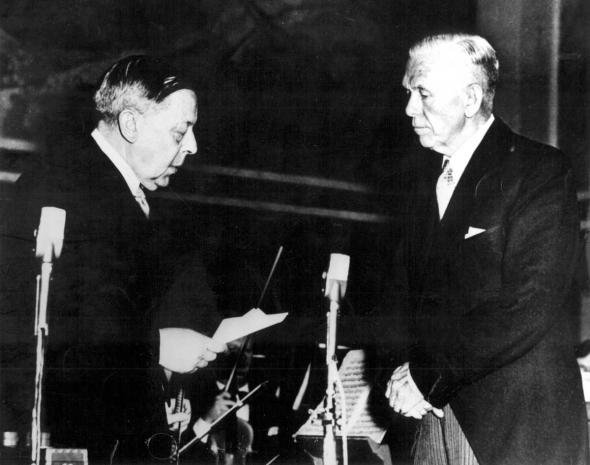Marshall’s 1953 Journey to Oslo and the Nobel Peace Prize
Modesty, Malady and a Powerful Message
In October of 1953, when George C. Marshall learned he would be awarded the Nobel Peace Prize “for proposing and supervising the plan for the economic recovery of Europe,” his response was true to form – humble and magnanimous. Suffering from an acute bout of influenza, he emerged from his Pinehurst, North Carolina home and told the press the award was a tribute “to the American people” and especially lauded the contributions of the late Senator Arthur Vandenberg, who had died earlier that year.
The economic assistance provided by the United States to a devastated continent under Marshall’s namesake recovery plan served as the foundation of restoring the infrastructure and democratic institutions of postwar Europe, yet he consistently deflected praise for shaping the most successful foreign aid program of the 20th century.
Marshall’s flu was severe – serious enough that President Eisenhower sent a plane to fly him from Pinehurst to Washington for treatment at Walter Reed Hospital. From his hospital bed, Marshall expressed his deep affection for his wife Katherine: “Dearest, I am so anxious to see you and so impatient to get back. I love you very much and miss you hourly,” he wrote.
Marshall was set to receive the Nobel on December 10th in Oslo, Norway, with his Nobel Lecture to be delivered the following day. As the date of the Oslo presentation drew nearer, however, his condition remained serious. After more than two weeks at Walter Reed, Marshall returned to Katherine in Pinehurst showing some improvement, but far from full strength.
Marshall on the deck of the Andrea Doria
Katherine, who had already decided she would not make the trip due to her own bout with the flu, did not want her husband to make the arduous journey to Norway in his weakened condition. Despite Katherine’s concerns, Marshall opted to make the transatlantic journey to receive prestigious award in person. At the advice of his doctors, he would travel by ship to avoid bad weather and recover in sunlight on the Italian liner Andrea Doria (history remembers her for sinking in 1956), which would take a southern route to the port of Naples, Italy. From there, he would fly to Paris and then to Oslo.
Voyage to Europe
The itinerary was now in place, but the drafting of his soon-to-be historic Nobel Lecture was another matter. Marshall’s hopes that his health would improve and that he would have time on board to draft his speech turned out to be wishful thinking. The rainy weather and his lingering sickness made it impossible for Marshall to on deck. He described the rocky conditions in a letter to Katherine: “During the movie yesterday a heavy sea ran all the chairs down to one side of the room partially piling them up there. The racket was terrific. The ‘grown ups’ were frightened, and the youngest children delighted.”
Sick at sea, the loneliness wore on him. “I send you a great deal of love, dearest. I miss you in my cabin, at meals, and on deck,” he wrote to Katherine, admitting that he was “having a terribly hard time getting down to the business of writing my lecture. I can't seem to concentrate.” He arrived in Naples without a single line committed to paper.
He then flew to Paris, where he was hosted by NATO Supreme Allied Commander Europe (SACEUR) General Alfred Gruenther. Marshall wrote to Katherine that he remained essentially incapacitated in his private suite, where he “remained in bed all day” except for dinner.
Despite his condition, Marshall “gritted [his] teeth and plunged into the lecture” with the aid of a stenographer. Unhappy with the first draft, Marshall enlisted his host’s talented young speechwriter, Colonel Andrew Goodpaster (later Superintendent of West Point), for more help. Goodpaster, seated on the floor of Marshall’s suite, organized and fine-tuned the various dictations to form a solid speech. With some additional retyping by Marshall, the elusive Nobel Lecture was finally ready.
Oslo
On December 10, 1953, in Oslo, George C. Marshall accepted the Nobel Prize for his work in the service of an enduring peace. Marshall became the only professional soldier in history to receive the Nobel Prize, a detail that stirred some controversy. When he walked up to the podium, three protesters in the balcony rushed forward and began dropping handbills that accused Marshall of military crimes, all while screaming, “Murderer! Murderer!” Marshall looked up calmly.
Marshall receiving the Nobel Peace Prize
Members of his air crew were sitting near the demonstrators and quickly pulled them back from the balcony. King Haakon VII of Norway and his family jumped to their feet, followed by the entire audience, to give the general a thunderous ovation.
The following evening, Marshall began his acceptance speech with an honest acknowledgement that he “lacked the magic and artistry” of Winston Churchill, who had been awarded the Nobel Prize for literature the day before in Stockholm, Sweden. But he was not about to waste this once-in-a-lifetime opportunity.
His Message
In his lecture, Marshall addressed head-on what he described as the “considerable comment” over the awarding of the Nobel Peace Prize to a soldier. “I am afraid this does not seem as remarkable to me as it quite evidently appears to others,” he remarked. “The cost of war in human lives is constantly spread before me, written neatly in many ledgers whose columns are gravestones. I am deeply moved to find some means or method of avoiding another calamity of war.”
Marshall was never particularly proud of his speech – saying that it was jumbled together hastily by a recovering sick man with some last-minute help. But looking upon it now, that part of the story is quickly lost as the power and clarity of his enduring message and wisdom shine through.
“Tyranny inevitably must retire before the tremendous moral strength of the gospel of freedom and self-respect for the individual, but we have to recognize that these democratic principles do not flourish on empty stomachs, and that people turn to false promises of dictators because they are hopeless and anything promises something better than the miserable existence that they endure.”
It is one of his most famous speeches, second only to his speech at Harvard about the European Recovery Program.
The Nobel Peace Prize was but one of the countless accolades that Marshall received during and after his 50 years of continuous service to his nation and the world. Marshall never expected or even wanted awards like the Nobel Peace Prize. He simply served at the will of the people and pursued a peaceful aftermath to world war through his selflessness, unwavering integrity and visionary leadership. Leaders today would do well to emulate these principles – and Marshall’s character – to build a freer, more peaceful world.
This article used as a source “Marshall: A Statesman Shaped in the Crucible of War” by Rachel Yarnell Thompson, which is available for purchase on the Marshall Center’s website.


